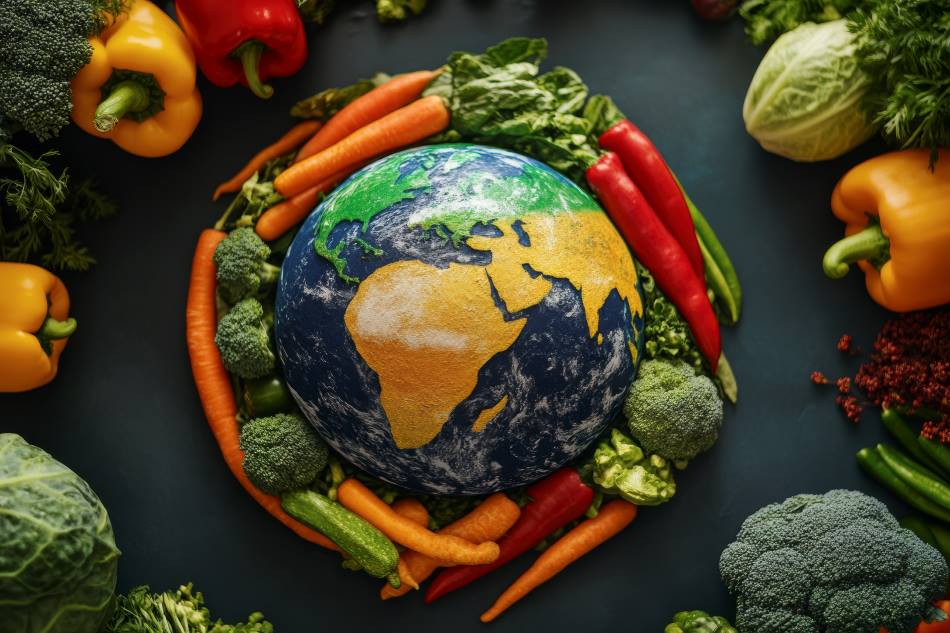As Earth Day approaches on April 22, a new Physicians Committee for Responsible Medicine/Morning Consult survey shows that 46% of Americans would consider eating a plant-based diet to help reduce greenhouse gas emissions from food production.
The poll included 2,203 U.S. adults surveyed March 24-26, 2025. When asked, “How strongly would you consider eating a plant-based diet to help reduce greenhouse gas emissions?” 16% said they would “strongly consider” it, while another 30% said they would “somewhat consider” it.
Shifting diets from meat and other animal products to plant-based diets has a high potential for reducing carbon footprints and mitigating climate change, as well as improving human health, according to Climate Change 2022: Mitigation of Climate Change, a report from the United Nations’ Intergovernmental Panel on Climate Change.
“This Earth Day — and every day — people should eat a plant-based diet to keep themselves and the planet healthy,” says Roxanne Becker, MBChB, DipIBLM, a doctor with the Physicians Committee who recommends a plant-based diet to patients for their health. “From cutting greenhouse gas emissions to cutting the risk of diet-related chronic diseases like heart disease and type 2 diabetes, a plant-based diet is a win-win.”

More than half of those surveyed, 54%, did not know what foods contribute to greenhouse gas emissions.
According to research compiled by the United Nations that looked at the greenhouse gas emissions of several foods, beef ranks highest in kilograms of greenhouse gas emissions (70.6 kg) per kilogram of food, followed by cheese (23.9 kg), tofu (3.2 kg), vegetables (0.7 kg), and nuts (0.4 kg).
When asked to rank these foods based on the amount of greenhouse gases emitted, most respondents, 54%, correctly ranked beef as contributing the most greenhouse gas emissions.
Cattle produce methane as part of their digestive process, called enteric fermentation. When cows burp, the methane is released into the atmosphere. Methane is also produced when animal manure is stored or managed in lagoons or holding tanks, according to the Environmental Protection Agency.
Experts say that cutting emissions from methane, which is relatively short-lived but has around 80 times more warming potential than carbon dioxide, is critical in preventing catastrophic climate change.
Forty percent of survey respondents said they “strongly agree” or “somewhat agree” that “the meat and dairy industry should be taxed on greenhouse gas emissions to help offset climate change,” which Denmark plans to begin doing in 2030.
Fifty-nine percent of respondents said they “strongly agree” or “somewhat agree” that “the government should offer incentives to farmers to convert from animal agriculture to growing crops and orchards to help benefit the environment.”
When asked, “How strongly do you agree that federal food policy, such as the Dietary Guidelines for Americans, should discuss the impact that food choices have on climate change, ecosystems, and the environment?” a combined 60% said they “strongly agree” or “somewhat agree.”
Although the impact of diet on the environment is not mentioned in the Dietary Guidelines, research shows that the Dietary Guidelines’ Healthy Vegetarian Dietary Pattern has half the carbon footprint of the Guidelines’ main recommendations. The Healthy Vegetarian Dietary Pattern’s protein group replaces meat, poultry, and seafood with plant-based items including legumes, soy, nuts, and seeds.
***
Founded in 1985, the Physicians Committee for Responsible Medicine is a nonprofit organization that promotes preventive medicine, conducts clinical research, and encourages higher standards for ethics and effectiveness in education and research.
Article Source:
Press Release/Material by Physicians Committee for Responsible Medicine, USA
Featured image credit: Freepik




